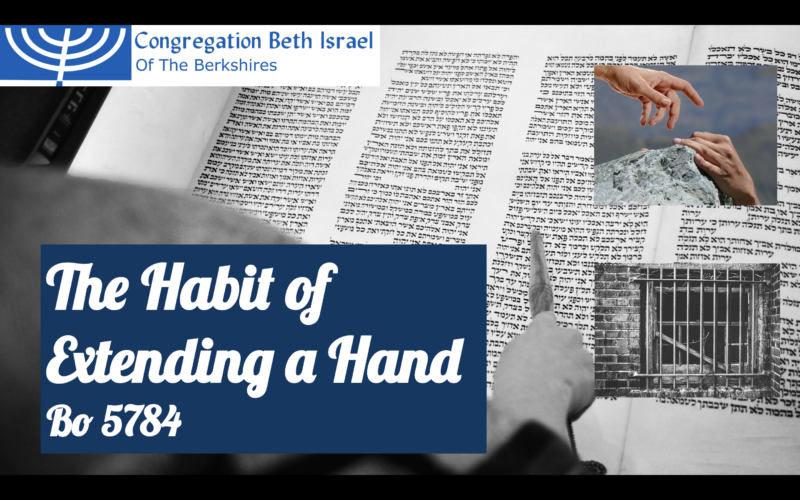This week’s Torah portion, Bo, begins: “God spoke to Moshe saying: Come to Pharaoh. For I have hardened his heart and the hearts of his servants, in order that I might display these My signs among them…” (Ex. 10:1) What does this verse come to teach us this year?
During the first several plagues, Torah tells us that Pharaoh hardened his heart. By this point in the story, Pharaoh has hardened his heart so many times that it just stays that way. God “hardening Pharaoh’s heart” is the spiritual stuckness from Pharaoh’s own repeated choices.
Habits become self-sustaining. The grooves of habit become like a rutted road: after a while, staying in those ruts is the path of least resistance. It’s like a psychological-spiritual version of Newton’s First Law (the teaching that an object in motion tends to stay in motion).
This early part of Exodus invites us to look closely at our habits, at the grooves we carve on heart and mind. Two weeks ago the Voice at the burning bush told Moshe to take off his shoes because he’s standing on holy ground. The word for “shoes” there can also mean “habits.”
Some habits are great: kindness, gratitude, treating people well. They may become rote sometimes, but these are ruts I’m happy to be fixed in. And some habits are harmful, e.g. hardening our hearts to people’s needs and their suffering, or assuming the worst of people.
Some of us might struggle more with hardening our hearts to our own needs, or assuming the worst of ourselves, not treating ourselves with the kindness we would bring to anybody else. That’s a kind of self-perpetuating Mitzrayim, a Narrow Place that we maintain for ourselves.
Some of us might struggle with feeling that the problems of the world are so vast that we might as well not even try to fix them. “The climate’s already a disaster, why even bother.” Or maybe we become paralyzed by political news. And the paralysis becomes its own rut.
A bit later in this week’s parsha, “Moses held out his arm toward the sky and thick darkness descended upon all the land… People could not see one another, and for three days no one could move about; but all the Israelites enjoyed light in their dwellings.” (Ex. 10:22-23)
The commentator Ramban says, “this darkness was not a mere absence of sunlight… Rather, it was a thick darkness.” Maybe an emotional darkness. Despair can feel like a thick darkness. And yet Torah says that in this darkness, “the Israelites enjoyed light.” What’s that about?
In Proverbs (6:23) we read that each mitzvah is a candle and the Torah is light. Maybe Torah says we had light in our dwellings because we had our connective-commandments and our wisdom tradition. And maybe we had light because we reached out to each other.
And that reminds me of a story in Talmud about a visit to someone who is sick. R. Yochanan says to his friend R. Hiyya, “Is your suffering dear to you?” In other words: do you want to be sick? And R. Hiyya says no. So R. Yochanan reaches out, and lifts him up into healing.
And then R. Yochanan falls ill, and R. Hanina does the same for him. So the Gemara asks: why didn’t R. Yochanan heal himself? The answer is, “a prisoner cannot free himself from prison.” (Brakhot 5b) Nobody can bootstrap themself. Our work in this life is to free each other.
That’s the habit we really need to cultivate: noticing who’s in Mitzrayim, and helping them get out. We can cultivate the habit of lifting each other up. Being a light in dark times, and a helping hand to those who are bound, whether by circumstance or illness or injustice.
Maybe this means sitting with someone who’s sick or struggling, saying, “I see you, and I’m here with you where you are.” Make a habit of little actions of kindness. We never know when a small action might be making an outsized difference in someone’s life.
Maybe it means volunteering or donating to support a world of greater justice. Reproductive rights aren’t at risk in our state. But in a lot of states they’ve been gutted, and activists are mobilizing to try to ensure a federal abortion ban, depending on how this year’s election goes.
And that’s just one issue among many. Here’s the thing: feeling helpless or powerless is self-perpetuating. And so is claiming our agency: our capacity to do something, anything, to help someone out of life’s tight places. On a micro level, or a macro level.
What we can do may not fix things. But settling into the habit of doing nothing definitely won’t fix anything. So… an invitation to think for a minute about something you can do in the new week to reach a hand to someone. Don’t say it out loud, just set the intention in your heart.
Holy One of Blessing:
Help us to soften our hearts.
Attune us to our habits
Especially the ones worth keeping.
Enable us to be a light for one another
And to lift one another
From loneliness and illness,
Injustice and despair.
May our Shabbat be gentle.
And tomorrow night as the week begins
Arouse our compassion and our care
And our capacity to act.
And let us say: Amen.
This is the d’varling that Rabbi Rachel offered at Kabbalat Shabbat services (cross-posted to Velveteen Rabbi.)






